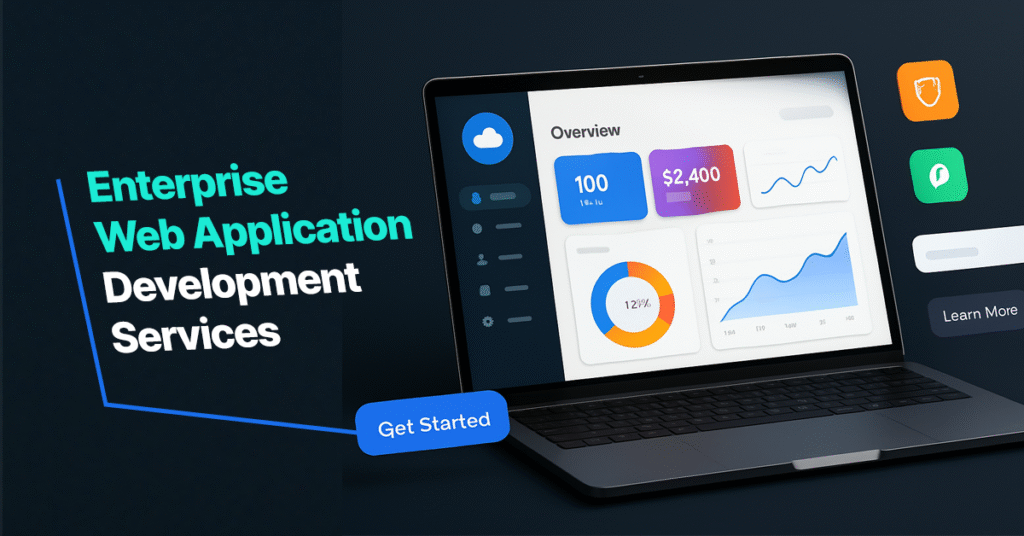Let’s get real. The system you’re on today is holding you back. Every delay costs you money, adds risk, and allows competitors to get ahead of you.
Here’s the truth: businesses today do not require off-the-shelf software. Forward-thinking companies rely on custom enterprise web application development services. They evolve rapidly, as needed, and provide a competitive edge.The numbers back it up.
Organizations running tailored enterprise web applications move three times faster than those stuck with outdated tech. Nearly 80% of executives admit they waited too long to make the shift. And with every month that passes, the gap between leaders and laggards grows wider. Enterprise web applications help organizations streamline operations and enhance business efficiency. When combined with process intelligence software, these applications provide deeper visibility into workflows, helping businesses identify inefficiencies and optimize processes in real time.
It’s about making a strategic call. One that decides whether you lead your market or scramble to keep pace. So the real question if you can afford it,
Let’s dive in and know more about it
Why Custom Enterprise Web Apps Are a Strategic Necessity
Off-the-shelf SaaS solutions are made for mass deployment. They work well when your requirements are simple and generic. But business companies do not welcome simplicity. With different teams, global operations, high compliance needs, and intricate workflows, these generic solutions tend to have limitations.
That is exactly where custom enterprise web solutions and enterprise software development services pay their dividends. These are carefully designed to fit your company perfectly, solving the particular pain points your teams face day in and day out. They provide flexibility and control that commoditized tools cannot provide.
-
End-to-End Automation
Think about the hours your team spends on invoices, inventory, and onboarding. A custom web app can automate this, letting your team focus on more valuable work.
In accounting, it matches accounts in real-time and speeds up the approach. In the supply chain, it keeps stock in alignment and suppliers in the know. In Human Resources departments, it recruits new employees with no unnecessary back-and-forth. In customer support, AI sorts and routes tickets so agents focus on the important issues.
The outcome? Fewer errors, quicker processes, and a massive jump in overall productivity.
-
Unified Data Systems
Data silos are the enemy of progress. When teams work together across standalone systems, decision-making is slowed down and mistakes are introduced. Custom enterprise web development services bring your systems together and place your data in one place, clean, current, and action-ready.
Executives get dashboards with real-time regional performance. Managers track team KPIs without going into spreadsheets. Role-based access makes sure the right people see the right data securely. This clarity speeds decisions and is focus-oriented, showing that far from the debate around is web development dying, the need for custom enterprise solutions is stronger than ever.
-
Security & Compliance Built-in
For business enterprises, security is not a choice; it’s mission-critical. When you use custom enterprise web development, you’re not trusting the definition of security from someone else. You have a system designed within your particular compliance requirements and risk tolerance.
From zero-trust access controls to encryption, token-based authentication, and regulation compliance alignment, consider GDPR, HIPAA, and SOC 2, every single feature has been built from the ground up with security at its core.
Integrated audit trails and real-time warnings are offered, so your security personnel can act fast should there be something amiss. No add-ons; security is integrated where it is most needed: at the center of your enterprise web development company‘s system.
-
Modular Scalability
Built for expansion, built to last. Your business is constantly evolving, opening new offerings, expanding into new geographies, or expanding through acquisition. Your software must keep pace. With a custom app that is modular and scalable, you can introduce new features or even whole modules whenever you want.
Want to move into a new geographic area? You can include region-specific compliance without affecting the rest of your platform. Anticipating more users? No issue, cloud-native platforms are simple to scale. This kind of agility allows for faster adaptation, creates innovative risk-taking, and prevents costly reworks in the future
The Future of Enterprise Web Applications

Enterprise applications development services have become central to how companies innovate and compete. As industries evolve and customer needs become increasingly discerning, the tools supporting these applications are rapidly changing. A handful of technologies are already standing out as essential for leaders thinking ahead.
-
AI and Machine Learning
AI and machine learning are no longer test experiments. They’ve slipped into everyday use. Many firms now rely on them to check invoices, schedule maintenance before equipment fails, or point out customers who might soon walk away. Automating these jobs saves time and reduces errors. Just as important, it gives teams room to focus on decisions that need real judgment. Leaders value clear forecasts as choices backed by patterns are stronger than those made by instinct.
-
Low-Code/No-Code Platforms
Demand for custom apps is outpacing the capacity of most IT teams. Low-code and no-code tools give non-technical staff a way to solve smaller challenges quickly. A manager can build a dashboard; HR can set up a workflow without waiting weeks for developer time. Of course, governance still matters; these platforms work best when rules are set. But when handled well, they stop bottlenecks and keep innovation moving at business speed.
-
Generative Tools for Productivity
Generative tools are also finding their footing. They take the edge off blank-page work, writing early drafts, compressing huge reports, or offering a fresh angle in a planning session. They act like an assistant who handles the first 30 percent of the job. The payoff is faster progress, leaving room for people to sharpen ideas and make the final calls.
Enterprise systems need to blend with industries and customer expectations. Companies that start today will be better tomorrow, leading others to follow.
Read More: Top 10 Features Every Modern Web Portal Should Have in 2025
Conclusion
Enterprise web applications have become central to how businesses run and stay competitive. In many cases, the apps driving an organization determine how it can respond to change.
AI and machine learning are streamlining repetitive work with invoice checks and spotting when customers leave. Blockchain is giving industries tighter security and cleaner accountability. Low-code and no-code tools let teams create useful solutions without waiting on IT departments. And generative tools are taking the sting out of blank-page work. Systems must adapt as conditions shift.




